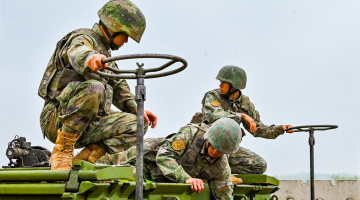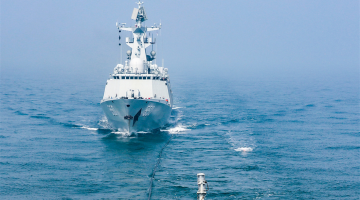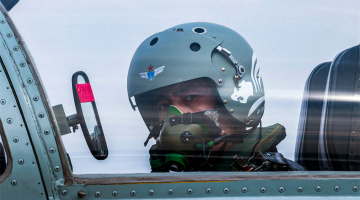By Gong Qifang

U.S. Marines conduct advanced marksmanship training alongside Colombian Marines as a part of subject matter expert exchange.
Tensions continued to rise in Venezuela, with no sign of abating shown, at least on the same day, from statements by Venezuela, the United States, and Russia.
Venezuelan Vice President Delcy Rodriguez announced the temporary closure of the Simon Bolivar International Bridge, the Santander Bridge and the Union Bridge on the Venezuela-Colombia border on the evening of February 22. The Simon Bolivar International Bridge serves as the most important land passageway between Venezuela and Colombia, and the Santander Bridge an important passage for trucks to shuttle between the two countries. Earlier, the Venezuelan government also closed the border with Brazil, and banned air and sea trips to and from three Dutch Caribbean islands.
US Secretary of State Mike Pompeo said on the same day that the United States would deliver humanitarian aid to Venezuela as soon as this weekend, expecting that Nicolas Maduro, Venezuelan President, would change his mind and allow these materials into his country. However, he declined to answer what possible consequences will be if the Venezuelan government refused the entrance, and only said that “every option is on the table.” It’s reported that the United States has already transported hundreds of tons of supplies to Cucuta, a border town of Colombia, a neighboring country of Venezuela, and constantly pressures Venezuela to accept the “humanitarian aid.” However, the Venezuelan government refused to accept the delivery and demanded the United States to lift its sanctions against Venezuela, seeing the so-called “aid” as a precursor for a US military intervention. On the contrary, Juan Guaidó, Venezuela’s opposition leader and self-proclaimed interim president, has previously expressed that he would take all necessary measures to ensure the entry of US supplies.
Meanwhile, Russian Foreign Ministry spokesperson Maria Zakharova said that the situation in Venezuela has reached at a critical point. The US-led crossing of the Venezuelan border by a so-called “humanitarian convoy” may lead to conflicts between supporters and opponents of the Venezuelan government, and form a convenient pretext for a military action to unseat the current legitimate president.
Although the US side announced that “every option is on the table”, no military option would be clean or easy.
On the one hand, both the US Congress and the international community advocate a peaceful solution to the Venezuelan issue. Eliot Engel, the Democratic Chairman of the House Foreign Affairs Committee, said that the Congress will not support the US military intervention in Venezuela, and “a US military intervention is not an option.” The International Contact Group Conference (ICG) on Venezuela, organized by more than 10 countries from Latin America and the European Union (EU), also called for a peaceful solution to the Venezuelan issue. The United Nations (UN), the Lima Group (fourteen countries within North, Central and South America have made up the group seeking to find a peaceful solution to the Venezuelan crisis), China and Russia also oppose military intervention in Venezuela. Other countries including Mexico and Uruguay have jointly proposed the “Montevideo Mechanism”, calling for solutions with the interests of the Venezuelan people at its heart, based on non-interference in the internal affairs of the country, peacefully solving differences, respecting human rights and rules of laws.
On the other hand, although the Venezuelan government led by President Nicolas Maduro is facing both internal and external pressures, it still receives military support. Venezuelan Minister of Defense Vladimir Padrino Lopez stated recently that no sanctions will disintegrate Venezuela, nor unnerve or fracture national dignity. He called on the military to “oppose imperialist aggression and strive for peace.” Venezuela held a six-day military exercise from February 10, the largest one in scale in the country’s history, to demonstrate its determination to resist external intervention.
At the same time, the United States must consider the serious consequences of military intervention in Venezuela. Joseph Nevins, an expert in US border issues, once wrote that it is the US’s frequent intervention into the national affairs of Central American countries that has led to political turmoil, poverty and crime in these regions, causing large numbers of immigrants to leave their homes and head north to the United States. Due to the US sanctions, nearly﹩10 billion funds and assets of Venezuela have been frozen. In addition, a combination of domestic hyperinflation and scarcity of materials has led large numbers of people to flee abroad. United Nations High Commissioner for Refugees (UNHCR) and the International Organization for Migration (IOM) announced in January that the number of migrants from and refugees in Venezuela has reached three million, resulted in the largest population movement in the modern history of Latin America.
Still, the possibility of a US military intervention in Venezuela cannot be ruled out. The United States has always regarded Latin America as its own backyard, and there is no lack of precedents of using military means to interfere in the internal affairs of Latin American countries in US history.
In conclusion, military intervention can indeed become an option for the United States, but it is by no means the right choice. A peaceful solution to any crisis is always the right choice.









